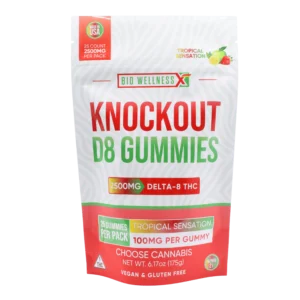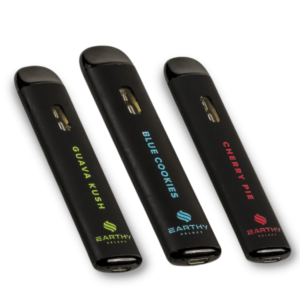Are you having trouble sleeping? In recent years, Delta-8 tetrahydrocannabinol (Delta-8 THC) has garnered significant attention for its purported sleep-inducing properties. As an analog of Delta-9 THC, the main psychoactive compound of cannabis, Delta-8 THC interacts with the body’s endocannabinoid system but often with milder psychotropic effects.
This professional guide aims to explore the potential mechanisms by which Delta-8 THC may promote sleep, examine relevant scientific research, and discuss appropriate dosages. Moreover, we will consider the synergy of Delta-8 THC with other cannabinoids and outline guidelines for selecting high-quality Delta-8 products.
Understanding these factors is crucial for individuals considering Delta-8 THC as a natural alternative for enhancing sleep quality.
Key Takeaways
- Delta-8 THC is being explored as a natural sleep aid due to Delta-8’s milder psychoactive effects compared to Delta-9 THC.
- Delta-8 THC connects with the body’s endocannabinoid system, promoting relaxation and helping individuals fall asleep faster and stay asleep.
- Initial research suggests that Delta-8 THC may help people fall asleep more easily and enjoy a more restful night’s sleep compared to other sleep aids.
- Combining Delta-8 THC with other cannabinoids like CBN and CBD, as well as terpenes, may enhance its sleep-inducing effects and provide additional benefits such as pain relief and anxiety reduction.
Understanding Delta-8 THC: A Comprehensive Review
Delta-8 THC, or Delta-8 Tetrahydrocannabinol, is a fascinating new cannabinoid derived from cannabis plants, most often the hemp plant. Think of it as a cousin to the more familiar Delta-9 THC but with its own unique qualities. Delta-8 THC is crafted through a conversion process from CBD, abundant in hemp. This compound induces a nuanced high, distinct from Delta-9 THC, often described as more relaxed and clear-headed, akin to indica strains.
Legally, Delta-8 THC exists as a sort of legal loophole to traditional marijuana. While Delta-9 THC (more often compared to a potent sativa strain) is federally restricted, Delta-8 isn’t explicitly regulated at the federal level, offering a legal path for its production and sale.
Delta-8 products come in diverse forms such as edibles, vape cartridges, tinctures, and capsules. Choosing the right product all depends on personal preference and desired effects. For discrete and delicious use, organic Delta-8 gummies might be the way to go. And for a more traditional experience, Delta-8 THC flower or a disposable Delta-8 tincture could be right for you.
Approach Delta-8 THC as a unique journey into the world of cannabinoids, but tread carefully, keeping an eye on local regulations, sourcing transparency, and your own comfort with its effects. Enjoy the exploration responsibly!
Delta-8 THC’s Potential for Sleep Support
Delta-8 THC’s potential for sleep support is very similar to how a typical indica strain works.
It engages with our endocannabinoid system, orchestrating a symphony with CB1 and CB2 receptors. CB1, residing primarily in the brain, and CB2, dispersed throughout the body’s immune system, become key players.
Delta-8 THC’s interaction with CB1 receptors, abundant in areas linked to sleep regulation, can potentially induce a sense of relaxation and tranquility. By modulating neurotransmitter release, it may contribute to a soothing and relaxing effect conducive to a restful night’s sleep.
Furthermore, its interaction with CB2 receptors, found in immune cells, might alleviate discomfort or pain that could otherwise disrupt peaceful sleep. This delicate interplay between Delta-8 and our endocannabinoid system showcases the compound’s potential as a sleep aid.
However, remember, research is still unfolding, and individual responses vary. Always approach such journeys with care, educate yourself with other reputable sources, and consider consulting with industry professionals.
Dosage Matters: Finding the Right Amount of Delta-8 for Sleep
Let’s chat about finding that sweet spot for Delta-8 THC when you’re hoping to catch some Zs. It’s not a one-size-fits-all situation, and how much you take can really make a difference in snagging a restful night’s sleep without any unwanted side effects.
Everyone’s different, so your friend’s perfect dose might not hit the mark for you. Your body size, how you personally react to cannabinoids, and how you take Delta-8—like in a 100mg Delta8 gummy or a tincture—can all mix things up.
The golden rule? Start small and take it slow. Kick things off with a tiny amount and inch up little by little until you find your sleep sweet spot.
Here’s a quick rundown on where you might begin, dose-wise:
- If you’re under 150 pounds, think about starting with 5 to 10 milligrams.
- Tipping the scales between 150 and 200 pounds? Maybe start with 10 to 15 milligrams.
- And for those over 200 pounds, a starting dose could be around 15 to 25 milligrams.
- If you’re an experienced user, you can probably scoot over to the higher ends of those numbers. New users should stick to the low dose.
Just remember, we’re all unique. These numbers are just a starting point. It’s all about listening to your body and maybe getting a bit of advice from a medical professional to nail down what works for you.
Now, why are we talking about Delta-8 doses, you ask?
Well, Delta-8 is a bit of a multitasker. It plays a role in regulating your sleep-wake cycle, which means you could be looking at better sleep quality and sleep cycles. But too much can leave you feeling a little foggy in the morning – so the right dose is crucial to healthy sleep cycles.
Combining Delta-8 with Other Cannabinoids for Sleep
Even though it works well on its own, combining Delta-8 THC with other cannabinoids like CBN and CBD could be a game-changer for your sleep. These compounds tend to work together, kind of like a dream team for your dream time, working hand in hand to tuck you in for a better night’s sleep.
This teamwork is what some folks call the ‘entourage effect’. It’s a fancy way of saying multiple cannabinoids are more effective than just one on its own – they enhance and boost the effects of the rest of the group.
But each cannabinoid works a little differently, let’s break it down a bit:
- CBN (Cannabinol): This lesser-known cannabis compound is getting quite the reputation as the ‘sleepy’ cannabinoid. It’s kind of like the warm milk of cannabinoids, potentially helping you dive into deeper, more restful sleep.
- CBD (Cannabidiol): The ‘superfood’ in the group. CBD is known for its huge variety of benefits, but it’s also all about those calming vibes. It might help calm your racing mind and get you into relaxation mode, setting the stage for Delta-8’s sleep-inducing magic.
- Terpenes: These are basically the essential oils of the cannabis world. Some of them, like myrcene and linalool, are like a lullaby for your senses, possibly helping you feel even more ready to fall asleep, and stay asleep.
Just remember, while we’re pretty excited about these natural sleep aids, research is still waking up to all the possibilities. It’s like a big puzzle we’re all trying to solve together. And if you’re thinking about giving these a try, maybe start with one at a time before combining them. Just to see where your body and mind is at.
Aiming for a good night’s sleep can sometimes feel like a battle, especially if you’re dealing with chronic pain or sleep disorders. But with these natural ingredients from the cannabis plant, you might find yourself snoozing more soundly.
Finding Premium Delta-8 Products: What to Look For
If you’re on the hunt for some great Delta-8 products for sleep, you’ll want to keep your eyes peeled for a few tell-tale signs.
First up, we’ve got to talk about third-party lab tests. The best brands out there make sure their Delta-8 THC is checked out for strength, cleanliness, and any unwanted extras. They’re usually proud to share these results, so you can be confident in what you’re getting.
Now, don’t forget to glance over the packaging. It should give you a breakdown on where the hemp came from, how they extracted the Delta-8 THC, and exactly how much you’re getting in each serving.
It’s also smart to check out what others are saying about the brand. Verified customer reviews can tell you a lot about the quality of their products. Plus, you’ve got to make sure they’re playing by the rules with the Delta-9 THC content—keep it under 0.3% to stay on the right side of the law.
If you do a little homework, you can snag some Delta-8 products that are not just legit but also ace at helping you slide into a peaceful slumber.
Delta 8 Gummies for Sleep
Studies show that Delta-8 THC can be helpful with many common sleep problems.
Cannabis edibles such as gummies are an awesome way to get the benefits of your favorite cannabinoids with a side of pure deliciousness.
Delta-8 gummies offer a body euphoria full of relaxation that’ll carry you to dreamland in no time.
Can Delta-8 THC Oil Improve Sleep Quality and Duration?
Are you struggling with restless nights and seeking a more peaceful slumber? Delta-8 THC oil might be the solution to improving your sleep quality and duration.
This all-natural sleep aid is gaining popularity due to its unique properties and natural ingredients. Unlike traditional over-the-counter sleep aids, Delta-8 THC oil has shown promising results in helping individuals fall asleep faster, stay asleep longer, wake up refreshed, and have fewer nightmares.
As a cannabinoid found in hemp and cannabis plants, Delta-8 THC oil interacts with your body’s endocannabinoid system to help regulate mood, appetite and, most importantly – promote sleep. By tapping into this powerful system within your body, Delta-8 THC oil can improve sleep quality by reducing anxiety levels that often keep people awake at night.
Where to Find the Best Delta-8 Products for Sleep
BioWellnessX is your go-to for Delta-8 THC products. Our commitment to quality, backed by rigorous third-party lab testing, ensures purity and potency.
Ethically sourced, our Delta-8 THC is derived from premium hemp, cultivated with care, and only combined with the finest ingredients. Indulge in a variety of meticulously crafted products, from relaxing tinctures to delightful fresh-baked Delta-8 cookies – all tailored to diverse preferences.
At BioWellnessX, transparency is a priority. Detailed product information, coupled with verified reviews, empowers you to make informed choices.
Our dedication to customer well-being extends beyond transactions, fostering a community where knowledge thrives.
Embrace the BioWellnessX difference—where trust, quality, and your satisfaction reign supreme. Your journey with Delta-8 as a natural sleep aid starts here – where excellence meets innovation.
Other Potential Benefits of Delta-8 THC
Even though Delta-8 can help you drift off to dreamland, it’s not just a one-trick pony. Delta-8 THC has a treasure trove of soothing benefits up its sleeve.
Imagine you’ve got a nagging ache that just won’t quit. Delta-8 might just be your new best friend because it’s been known to ease painful joints and discomfort. Feeling queasy? This compound could also play hero during those nauseous moments.
Now, if your mind is like a squirrel on a caffeine buzz, Delta-8 THC could be the mellowing whisper you need. It’s got a gentler touch than its cousin, Delta-9 THC, so you can kick back without feeling like you’re on a rocket ship to Mars.
And though more research is needed, Delta-8 THC holds promise for additional cognitive benefits due to its interaction with CB1 receptors in the brain.
The entire cannabis community is excited to dive deeper into what Delta-8 can do, because who knows? It might just be the helping hand we all need for a smoother day or a snugger night’s rest.
Delta-8 or Delta-9 For Sleep? Which Is Better?
It’s hard playing favorites with these two highly potent cannabinoids, especially for sleep. They both share a lot of similarities when it comes to helping you doze off, but their effects could make you decide on a favorite!
On paper, Delta-9 THC has more potent effects on our body’s endocannabinoid system, which makes it the better sleep option, and with that power comes a price of an overwhelming high.
But in reality, Delta-8 has the perfect balance of potency and moderation, which makes it a better option for most people who don’t enjoy the intense high that comes with Delta-9 THC.
Heavy THC users with high tolerance would feel that Delta-8 has a milder high with milder effects, and they would rather get a strong buzz before they doze off with Delta-9 THC.
While other users would feel that Delta-9 is “too much” and would prefer the high-potency Delta-8 (which has an extremely strong high) instead.
Bottom line: it’s up to you to decide which one is better for you in terms of sleep.
Final Thoughts: Using Delta-8 THC for Sleep
Delta-8 THC emerges as a compound with potential sleep-inducing properties, offering an alternative to traditional sleep aids or synthetic chemical aids. Its relationship with Delta-9 THC and its interaction with the endocannabinoid system suggests it can promote relaxation and play a big part in sleep support, though dosage optimization is critical.
While research is still evolving, combining Delta-8 THC with other cannabinoids may enhance its effects.
Consumers are advised to seek high-quality products and consult trusted experts to determine the suitability of Delta-8 THC for individual sleep needs.

Legal Disclaimer:
By reading this information presented, you agree to release the author of any liability that comes from using this data. This post contains no legal advice. Claims about cannabinoids have not yet been approved by the FDA. Read the full legal disclaimer here.
Interested in trying Delta-8 THC products for sleep? Get a FREE sample from BioWellnessX!
Other Articles About Delta-8 THC
- Best 50mg Delta-8 Edibles
- Best THC Cookies: Delta-8 Review
- The New Era of Legal THC Gummies Are Here
- Organic 50mg Delta-8 Gummies: Benefits and Effects
- Indica vs Sativa Edibles: What’s the Difference?
- Delta 8 Edibles Review And Where to Buy Them!
- Is Delta-8 or CBD Better For Pain? The Top 5 Differences!
- Delta-8 vs. Delta-10 For Pain: Which Works The Best?
- Delta-8 THC Delivery – How To Easily Get Your Delta-8 Delivered!
If you’re interested in more natural sleep aid alternatives, check out these articles:
- Delta-8, CBD or CBN for Sleep – Which is Best?
- Finding the Best CBN Gummies for Sleep and Insomnia
- CBN for Sleep – Does it Really Work?
References:
- 5 Things to Know about Delta-8 Tetrahydrocannabinol – Delta-8 THC
- Delta-8-THC: Delta-9-THC’s nicer younger sibling?
- Consumer Experiences with Delta-8-THC
- Hemp Production and the 2018 Farm Bill – 07/25/2019 | FDA
- The Controlled Substances Act (dea.gov)
FAQs About Delta-8 and Sleep Support
Delta-8 THC may influence REM sleep and dream patterns, potentially altering the duration and intensity of dreams, although its effects can vary and further research is needed to fully understand its impact on poor sleep.
Long-term consequences of using delta-8 THC as a sleep aid remain under-researched. Potential risks may include tolerance, dependency, and disrupted sleep patterns, necessitating further scientific investigation to clarify these effects.
Delta-8 THC may lead to tolerance or dependence with prolonged use, necessitating close monitoring and potential management strategies to mitigate these risks in individuals utilizing it for sleep-related issues.
When acquiring delta-8 THC, it is imperative to verify its legality in your jurisdiction, as regulatory frameworks vary widely, with some areas having stringent restrictions or outright bans on its sale and use.
Individual differences in metabolism and body chemistry can significantly influence the efficacy of substances, potentially causing varied responses and effectiveness across different persons due to genetic and physiological factors.










